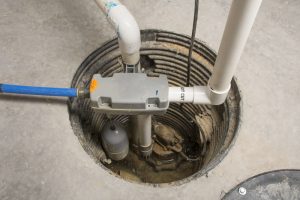You probably have heard about sump pumps and sewage pumps. In fact, your home may have one or the other or both. We’ve discovered that there’s often confusion in people’s minds when it comes to sewage pump vs. sump pump. Are they really the same thing, and if they’re different, what jobs do they do? The most important question: Do you need them?
We’ll look into these questions in this blog post. However, the best way to get an answer to the last question is to talk to our professional plumbers. We have extensive experience with all types of plumbing installations for both homes and businesses.
The Quick Answers: Sewage Pump vs. Sump Pump
You may have already figured out, based on our wording, that sewage pumps and sumps pumps aren’t synonymous. They do separate jobs for a home. They’re both types of pumps that remove unwanted material from a house and into the wastewater system, but in most other ways they’re very different. The majority of homes will benefit from a sump pump, while only specific types of homes need a sewage pump.
The Sump Pump
A sump pump is a part of a home’s waterproofing system, designed to prevent water damage in basements and crawl spaces. Typically installed in a pit (a.k.a. the sump) basin below ground level, the sump pump works to lower the risks of flooding by removing accumulated water.
When excess water accumulates around the foundation of a home, especially because of heavy rain or snowmelt, it’s directed into the sump pit. The sump pump then activates automatically to pump the water away from the foundation and safely discharge it to a designated drainage area, such as a storm drain or well.
Sump pumps come in various types, including submersible and pedestal pumps, each with its own set of advantages based on a specific home’s needs. Submersible pumps are placed directly in the sump pit, submerged in water, making them quieter and less obtrusive. Pedestal pumps have the motor positioned above the pit, allowing for easier maintenance access.
The Sewage Pump
A sewage pump is a specialized mechanical device designed to transport wastewater and sewage from a house and move it to the central sewage system. Also known as sewage ejector pumps or wastewater pumps, these pumps are typically installed in locations such as basements or sewage pits where gravity alone isn’t sufficient to move the wastewater to a higher elevation for proper disposal. The pump operates by creating enough pressure to push the sewage through pipes and into the sewer or septic system.
These pumps are constructed to handle the harsh and corrosive nature of sewage and wastewater. Additionally, sewage pumps often have impellers with special designs to effectively break down solid particles present in the sewage, ensuring smoother flow through the system.
If your home is built lower than the municipal sewage system, or lower than the septic tank you use, then a sewage pump is a necessity.
For expert plumbing service, installations, or maintenance contact Reliance Plumbing Sewer & Drainage, Inc. Our knowledgeable plumbers serve the North Shore and Northwest Chicago suburbs. Rely on Reliance!

